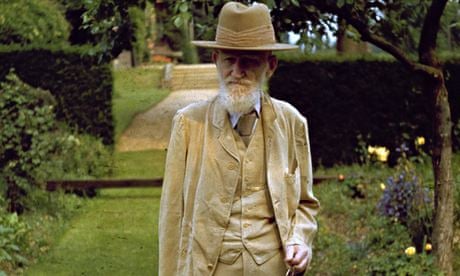The last small-screen production of a play by George Bernard Shaw was back in 1991, yet the Irish playwright remains the second most performed dramatist on British television. (No prizes for guessing the first.) From the 1930s on, television had a lengthy love affair with plays by Edwardian dramatists, at least until studio drama was elbowed aside by film in the 1990s and theatre plays on screen went the way of the dodo and the dirigible. Viewers enjoyed frequent productions of Oscar Wilde and John Galsworthy, as well as many by their near contemporaries from abroad, Anton Chekhov and Henrik Ibsen (who comes third in the league table of performances). But in numerical terms, Shaw was always in a class by himself. Given how unfashionable a stage figure he is today, this has for years both puzzled and intrigued me.
Before the war closed the fledgling television service in 1939, there had been eight productions of Shaw plays. On the day the medium returned for the victory parade on 7 June 1946, the BBC mounted The Dark Lady of the Sonnets, Shaw's imagining of Shakespeare meeting Queen Elizabeth. In 1952, the BBC gave over five Sunday evenings to the writer's near-unstageable cycle of futuristic speculation, Back to Methuselah. A decade later, Granada got into the act with a three-play GBS festival. All told, there have been well over 100 original productions of complete Shavian scripts. For comparison, there have been significantly more than 300 productions of plays by Shakespeare.
Shaw's plays were supremely popular between the wars, both in the theatre and on radio, and he was a dominant figure when the executives who would make television drama well into the 1960s were growing up. Before a new generation including Alun Owen, Ted Willis and Harold Pinter began writing original television plays in the late 1950s, TV was hungry for plays from the stage. Shaw could supply both meaty, full-length dramas and an abundance of one-act trifles. During this period the film industry ensured that almost all movies were kept out of the home; only in 1957, when it purchased 100 American titles, could the BBC begin to offer a dramatic alternative to plays.
Right through to the 1980s, drama was made primarily in the multi-camera studio. Film technology was too cumbersome and expensive for regular use, and in any case the technicians' unions ensured its use was tightly restricted. Studio drama is far more suited to speech than visual spectacle, and Bernard Shaw was recognised as a master of the former. Add to this the "classic" status his work had achieved by the 1930s, together with its comforting middle-class morality, and his dominance in the drama stakes starts to become more understandable.
By the 1950s, moreover, what had once been Shaw's bold engagement with social issues such as women's rights, prostitution, the arms industry, the Irish question and even the hypocrisies of organised religion could be accepted as unproblematic, especially if they were safely set in the context of turn-of-the-century costume drama.
Frustratingly, as is so often the case with classic television, little of this legacy remains. More than half of television's Shaw productions were broadcast before 1953, the year from which we have the first recordings of (non-Shavian) television plays. Many of the later productions have gone too, including Judi Dench's 1962 performance in the role of Major Barbara, of which The Times wrote "she has to perfection the golden girl quality, the hockey captain under the uniform". Most of James MacTaggart's 1968 production of Man and Superman, featuring Maggie Smith and Eric Porter, was also wiped, although a sequence of about three minutes survives in a documentary profile of Porter.
In the early 1960s, television turned away from the theatre play. First ITV, and then the BBC, with The Wednesday Play, made a strong commitment to original contemporary drama. Viewers responded with enthusiasm, and Shakespeare, Shaw and the stage were marginalised in "heritage" slots such as the long-running Play of the Month. Shaw's talkfests fell from fashion in the theatre as well, and rare indeed, at least on the British stage, are radical productions that attempt to reimagine how the best of his plays might be made relevant to contemporary audiences. Young directors such as Maria Aberg and Benedict Andrews mash up Shakespeare and Chekhov, but – perhaps because his plays remain in copyright – I have yet to encounter a production that offers a truly alternative gateway into GBS. One central strand of Tony Hall's new vision for the arts on BBC is stronger showcasing of theatrical riches from across the country, both onscreen and online. Is it too much to hope that, 25 years on from the last televised Shaw play, we might see a version of one of his dramas that feels as exciting and challenging as his work undoubtedly did to theatre audiences a century ago, and to pre- and postwar TV viewers?

Comments (…)
Sign in or create your Guardian account to join the discussion